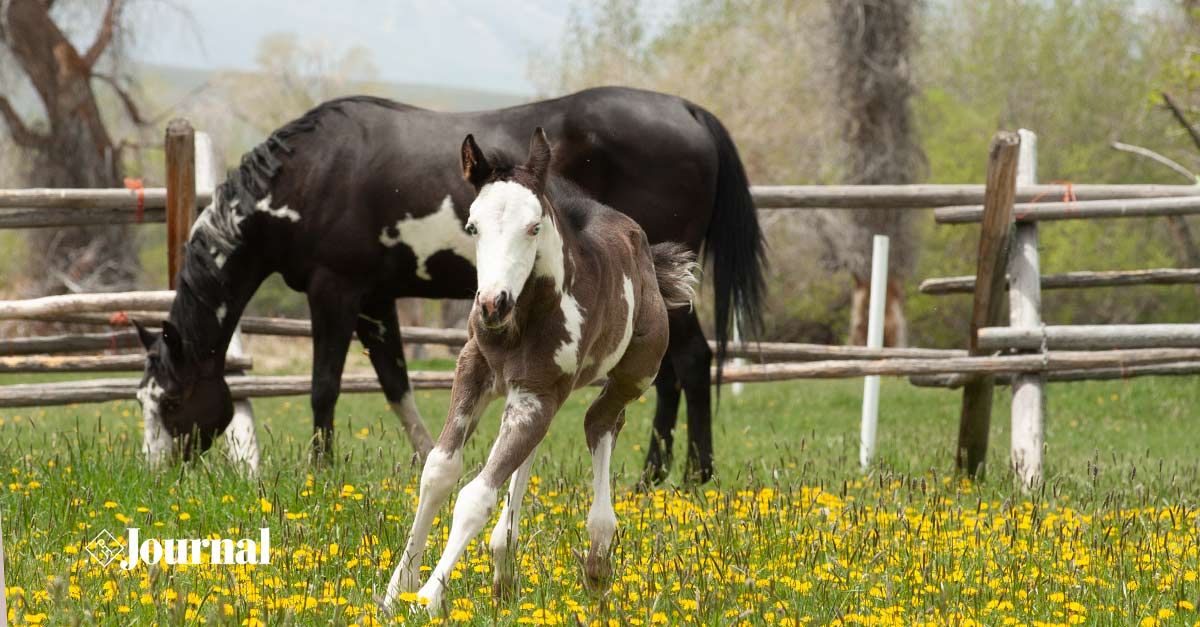Open For Business
Preparing your mare for successful conception starts with a pre-breeding exam.
By Tristin Morgan, D.V.M.
From the January/February 2020 Paint Horse Journal
Subscribe/Renew: apha.com/phj/subscribe/order-the-journal
An “open” mare is one that is not currently pregnant—there are multiple reasons a mare might be open, and preparing her for breeding success in the spring starts now.
Pregnancy rates vary depending on the age of the mare; most reach peak fertility around their 6-year-old year, and fertility declines as they age. Maiden mares at age 6 have a 50–60 percent chance of conception if bred to a fertile stallion each estrus cycle. Overall, older mares in their teens have about a 30 percent chance of conceiving.
Setting your mare up for successful conception starts with an exam from your veterinarian. A pre-breeding exam consists of a physical assessment, anatomical examination of her vulva, internal speculum evaluation of her vagina and cervix, internal palpation of her cervix, uterine culture, sensitivity and, often, a uterine biopsy. Additionally, an ultrasound examination of the mare’s reproductive tract can give your veterinarian a good picture of her uterine anatomy, ovarian follicles or corpora lutea, and help identify any potential problems, like the presence of fluid or cysts.
Your veterinarian will also probably grade your mare’s body condition score based on a nine-point scale—ideally, she should have a 5 or 6 score. Being too thin (1–3) or too fat (8–9) can contribute to problems conceiving. Any lameness issues should also be considered, as the lameness might get worse as pregnancy persists. Cushing’s disease and insulin resistance can cause issues with fertility as well. When discovered early, dietary and management changes can be implemented to help your mare get pregnant in the year to come.
A mare’s vulvar anatomy can affect her ability to become pregnant. When the anus is recessed deeper in the mare’s body than the vulva, this predisposes the mare to infections. A Caslick’s procedure might be needed to help keep her reproductive tract free from bacteria. Internal exam of the vestibule and cervix can also be helpful to rule out urine pooling due to poor reproductive conformation as well as scar tissue that might be present from a previous foaling.
Your veterinarian might collect a uterine sample or biopsy for a process known as culture and sensitivity. The laboratory will examine the uterine sample under a microscope and grow any bacteria found on the sample; then, they’ll determine any antibiotics to which the bacteria are sensitive, greatly helping your veterinarian determine the proper treatment protocol.
A uterine biopsy can be helpful if you’re trying to get a known “problem breeder” to conceive—a “problem breeder” is a mare that has failed to get pregnant for the last season or more due to a problem in her reproductive tract. This might include endometritis, delayed uterine clearance or anything in between. A biopsy can show the health of uterine tissue and the likelihood of that mare getting in foal.
An ultrasound of the reproductive tract is an asset to your veterinarian. It can highlight what the tissues look like and any fluid present, and helps identify problems before the breeding season begins. In my experience, it’s a vital part of a complete reproductive exam.
Outlining problems now during a pre-breeding exam gives you time to make a plan with your veterinarian about how to address these issues and treat them before breeding. Now is the time to start, so your mare is healthy and ready to breed when the time comes.





